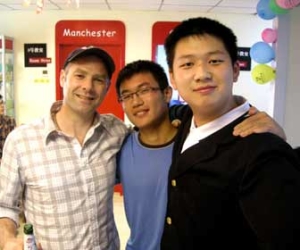On-the-Job: Teaching English Classes in Taiwan
When I arrived in Taiwan, English degree in hand and enthusiasm overflowing, I was sure that I was prepared for the flavors, the smells, the crowds and
confusion – the differences.

The only Chinese words I knew were for food and I’d never ridden a scooter, but that didn’t dent my confidence. I blundered into my teaching year wearing ignorance like a banner on my chest and thinking that I would have much to teach.
I start my days with the song of the garbage truck and a class full of housewives. We use the book to structure the lessons, but the conversation
never fails to stray – they tell stories about their families and wonder if I get lonely in my apartment. I try (sometimes it’s a futile effort) to tie the conversations back to grammar points and group work. When class is over and I’m again the foreign friend, I join my students for chow mein and zheng jiao at the market stalls. They’re always after me to try new things; one of my students swears that pig ears are better than chocolate. I’m still not sure about
that assessment, but I do enjoy the sea snails.
In the afternoons I teach children, and this is when my creativity and stamina are most heavily taxed. By the time I get them, the kids have already been in school for several hours and are wired. Classroom management is rather difficult when the words you have in common with your students are few, so
I’m thankful for the presence of a Chinese teacher.
We speak simply and laugh loudly, and despite the difficulties we somehow manage to come away from each class session with a sense of accomplishment.
I usually spend evenings with my students and friends, who are generous to a fault and love to share their land and their culture. They’ve shown me where to
buy the best onion cakes, helped me to refine my badminton game, taught me about Chinese family life, laughed as I sang “Country Roads” at a karaoke bar, and instructed me in changing the blown tires on my motor scooter. I’m convinced that their kindness isn’t tied to knowing me: once a perfect stranger informed me that my scooter (I had learned to ride by that time) had been towed, and then drove me to the impound to help me retrieve it.
Another man
offered to transport a package that was too large for me to carry from the post office to my school.
The cultural contrasts between Taiwan and the United States are ubiquitous. At first I focused on the small things – should I drink Coca Cola or bamboo juice with my lunch? Should I buy food and try to cook at home like I would in the States, or should I buy my meals at the markets like everyone else? What’s
the most efficient way to use the squat toilet? When I go jogging, are the stares I get out of curiosity, or do they mean something else? One of the many lessons I had to learn was not to sweat the small stuff. I wanted to embrace the differences, but nearly drove myself crazy concentrating on the wrong ones.
The right lessons to cultivate were the ones that had to do with my sense of self
in relation to other people. I arrived with this fierce American independence and “I can do it myself” attitude, and found that my idea of how to exhibit that independence was completely incompatible with the culture. I needed the people around me – my students, friends, and strangers – to help me with the little stuff, yes, but I also needed them to show me how to function in their world, where group accomplishments are often more important than individual
ones. That lesson also taught me how to better relate to my students and to understand why, for example, they’re hesitant to respond to questions individually, but can work wonders if they’re in groups. I’ve learned how to be a student: to observe, to ask questions, and to be humble – I’ve swallowed my pride hundreds of times during this year, but I’ve never once regretted my decision to come.


 Teach English in Asia
Teach English in Asia  Cruise Ship Jobs
Cruise Ship Jobs  Alaska Fishing Industry Jobs
Alaska Fishing Industry Jobs  Sharing Economy / Gig Economy
Sharing Economy / Gig Economy